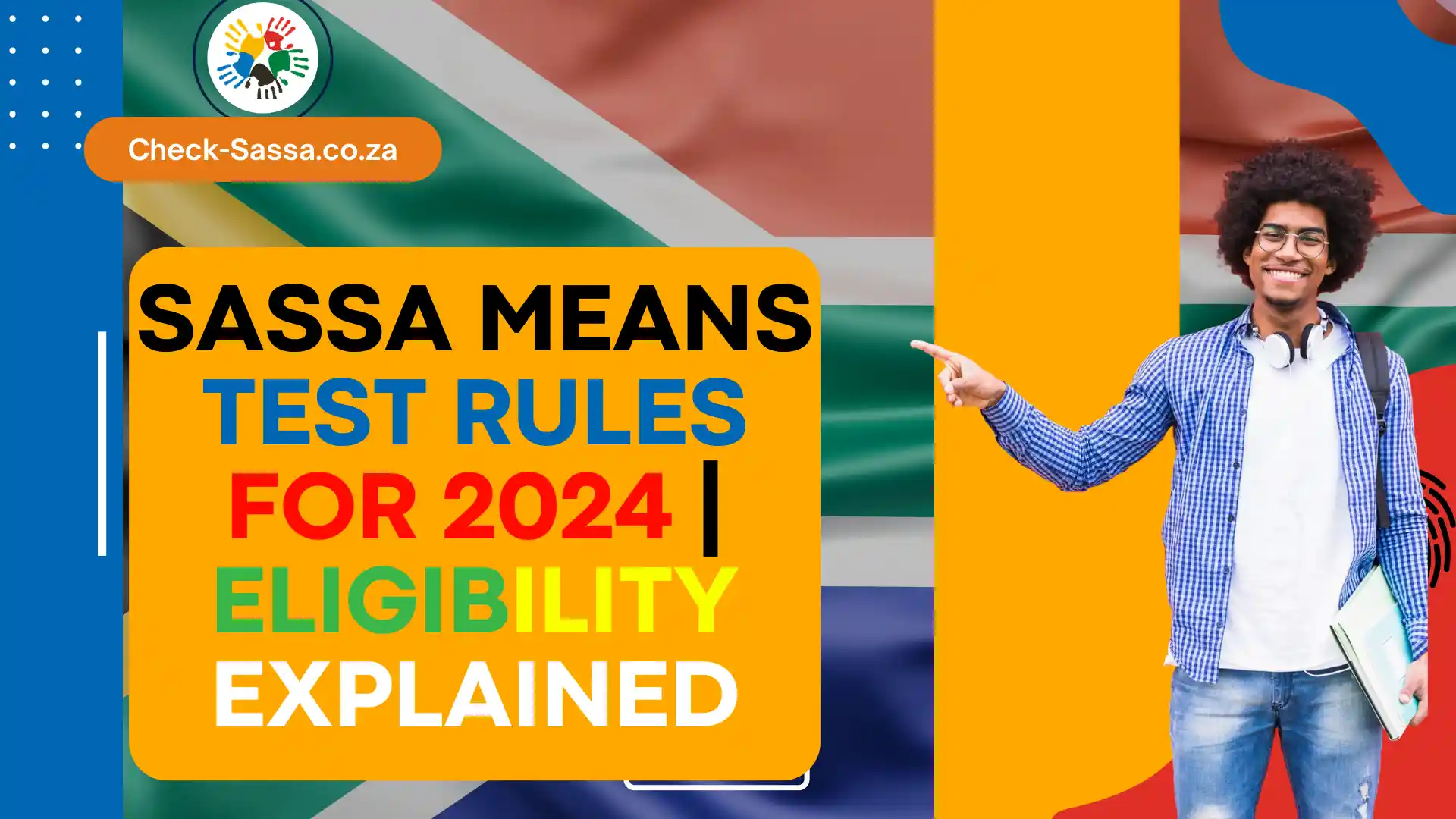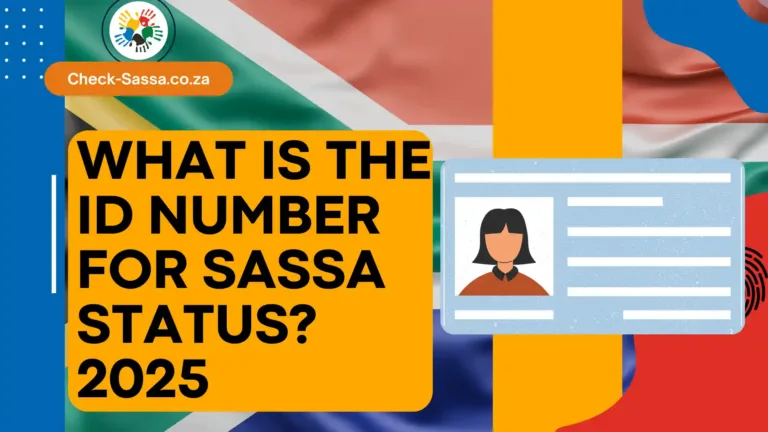SASSA Means Test Rules for 2024 | Eligibility Explained

The SASSA Means Test plays a crucial role in determining eligibility for social assistance programs in South Africa.
If you or someone you know is applying for grants such as the Social Relief of Distress (SRD), Older Persons Grant, or Disability Grant, understanding how the means test works is essential.
This article provides an in-depth explanation of the SASSA Means Test, how it affects grant applications, and what applicants need to know to navigate the process successfully.
SASSA Means Test Rules for 2024 (Short Answer)
In 2024, SASSA applies a means test to assess eligibility for grants. Here’s a quick summary of the key points:
- The test evaluates your income, assets, and overall financial condition.
- Income limits: R8,070/month for individuals, R16,140/month for married couples for most grants.
- Asset limits: R1,372,800 for individuals and R2,745,600 for married couples, applicable to Old Age and Disability Grants.
- The Child Support Grant only considers income.
- The Foster Child Grant does not require a means test.
- These limits are reviewed and updated twice a year, on April 1st and October 1st.
- Married couples are assessed together as a unit.
- For the most up-to-date information on thresholds, visit the official SASSA website.
What Is the SASSA Means Test?
The South African Social Security Agency (SASSA) uses the Means Test to assess whether individuals qualify for financial assistance from the government. The test evaluates an applicant’s income, assets, and overall financial situation. It ensures that only those who truly need government assistance receive grants, helping to prevent misuse of public funds. The SASSA Means Test is part of a broader system designed to support vulnerable populations such as the elderly, disabled, and low-income families.
Key Components of the Means Test
The SASSA Means Test considers multiple factors, including:
- Income: This includes salaries, wages, pensions, rental income, and any other source of regular income.
- Assets: The test evaluates the total value of an applicant’s assets, such as property, vehicles, savings, and investments.
- Household Composition: The number of dependents in the household can influence eligibility, with larger households possibly qualifying for higher grants.
Why Is the Means Test Important?
The SASSA Means Test helps to ensure that the Social Assistance System is fair, transparent, and sustainable. It allocates resources to those in need based on an accurate assessment of financial hardship. The means test also serves as a safeguard against fraud by preventing individuals with sufficient means from accessing social grants.
Social Grants Affected by the Means Test
The following social grants require applicants to undergo a means test:
- Old Age Grant: Available to South African citizens aged 60 years or older who meet the financial criteria set by the Means Test.
- Disability Grant: Provides financial support to individuals who have a disability and are unable to work. The Means Test considers the applicant’s financial resources.
- Child Support Grant: Though not typically means-tested for children under the age of 18, the Means Test applies to the parents or caregivers who apply for the grant.
- Foster Care Grant: This grant supports foster parents who are caring for children in state care. The Means Test evaluates the financial situation of the foster parents.
- Social Relief of Distress (SRD): This grant is designed to provide temporary assistance to individuals experiencing severe hardship. Eligibility is determined based on the applicant’s financial circumstances.
SASSA Grant Income and Asset Thresholds for 2024
Income Limits for Key Grants:
- Old Age, Disability, Grant-in-Aid, and War Veterans Grants:
- Single individuals: R8,070 per month (R96,840 annually)
- Married couples: R16,140 per month (R193,680 annually)
- Disability Grant:
- Single individuals: R8,070 per month (R96,840 annually)
- Married couples: R16,140 per month (R193,680 annually)
- Child Support Grant:
- Single caregivers: R5,000 per month (R60,000 annually)
- Married caregivers: R10,000 per month (R120,000 annually)
Asset Limits for Key Grants:
- Old Age & Disability Grants:
- Single individuals: R1,372,800
- Married couples: R2,745,600
- Foster Child Grant: No means test applied.
- Child Support and Care Dependency Grants: Only income is considered, not assets.
What is Considered “Income” for the SASSA Means Test?
SASSA reviews a wide range of income sources when determining eligibility, including:
- Pension fund payouts
- Business or farm profits
- Financial support from family or friends
- Rental income
- Child maintenance payments
- Salaries or wages
- Payments from UIF, RAF, or COIDA
Allowable Deductions to Lower Assessed Income:
Certain expenses can reduce the income considered in the means test, such as:
- Medical aid contributions
- Taxes paid
- Pension fund contributions
What is Considered an “Asset” for the SASSA Means Test?
SASSA also calculates an applicant’s assets, including:
- Bank account balances (individual or joint with a spouse)
- Property, land, or real estate (excluding a primary residence)
- Investments, including shares and unit trusts
- Retirement annuities (for retirees)
- Outstanding loans or debts
Additional Considerations:
- Primary homes are exempt for pensioners.
- Unmarried applicants’ assets are assessed individually.
- For married couples, combined assets are assessed together.
Latest Social Grant Amounts (as of November 2024)
Here’s a snapshot of social grant amounts effective in November 2024. These may change again in April 2024.
| Grant Type | Previous Amount | New Amount | Increase |
|---|---|---|---|
| Old-Age Grant (60-74 years) | R2,180 | R2,190 | R10 |
| Old-Age Grant (75 years and older) | R2,200 | R2,210 | R10 |
| Disability Grant | R2,180 | R2,190 | R10 |
| Care Dependency Grant | R2,180 | R2,190 | R10 |
| War Veterans Grant | R2,200 | R2,210 | R10 |
| Child Support Grant | R530 | R530 | No increase |
| Foster Care Grant | R1,180 | R1,180 | No increase |
| Social Relief of Distress (SRD) | R370 | R370 | No increase |
How the SASSA Means Test Works: Step-by-Step
Step 1: Gather Financial Information
Before applying for any social grant, gather all necessary documents related to your income and assets. This includes bank statements, payslips, proof of property ownership, and other financial records. For dependents, documentation such as birth certificates and school records may also be required.
Step 2: Submit an Application
Submit your application through the official SASSA website or at your nearest SASSA office. You will be required to fill out detailed forms, providing information on your financial status, household composition, and other relevant data. In some cases, applications can be processed online, but applicants may need to visit SASSA offices for in-person verification.
Step 3: Assessment by SASSA
Once your application is submitted, SASSA will evaluate your financial situation. This assessment involves calculating your income, reviewing your assets, and considering the size of your household. The means test criteria are adjusted based on the type of grant you are applying for, and SASSA uses this information to determine whether you qualify for assistance.
Step 4: Eligibility Decision
After the assessment, SASSA will notify you of the outcome. If you meet the eligibility requirements, you will be approved for the grant, and payments will be made according to the terms of the program. If you are disqualified, you may appeal the decision or explore alternative financial assistance options.
Income Limits for the SASSA Means Test
The SASSA Means Test sets specific income thresholds for each type of social grant. These limits are subject to change based on government budget allocations and inflation rates. Applicants must ensure that their income falls within the prescribed limits to qualify for assistance.
Here are some typical income thresholds for different grants:
- Old Age Grant: Applicants must have an income below R2,000 per month if single, or R4,000 per month if married.
- Disability Grant: Income limits are generally set around R2,000 for a single applicant and R4,000 for a married couple.
- Child Support Grant: The means test primarily applies to the parents or caregivers, who must have a household income below R47,000 per year (or R3,900 per month).
These figures are periodically adjusted, so it is essential to check the latest income limits with SASSA or through official government publications.
Assets Considered in the Means Test
The Means Test also examines the applicant’s assets. Applicants who own significant assets, such as expensive property, vehicles, or large savings, may be disqualified from receiving grants. Here are some examples of assets that SASSA considers during the assessment:
- Property: If you own property that could be sold or rented for income, this will be evaluated.
- Vehicles: The value of any vehicles you own is considered. Typically, vehicles valued at R80,000 or more may disqualify you.
- Savings and Investments: Large savings accounts or investments can affect your eligibility. However, smaller savings accounts or emergency funds are usually not a concern.
Common Challenges and How to Overcome Them
Inaccurate Income Reporting
One of the most common issues applicants face is misreporting their income. It is essential to be honest and accurate when filling out the application forms. Providing false or misleading information can lead to delays, disqualification, or even legal consequences.
Difficulty in Meeting Income Limits
For some, meeting the income criteria can be difficult, especially when income fluctuates or is not consistent. In these cases, applicants may need to provide supporting documents that explain irregular income sources, such as seasonal work or freelance income.
Appeals Process
If your application is rejected, you have the right to appeal. The appeal process involves submitting a formal request to SASSA to review your case. If you believe that your income or assets were miscalculated, or if there was an error in your application, filing an appeal could help you regain eligibility.
Conclusion
Understanding the SASSA Means Test is essential for those seeking financial support through social grants. By ensuring that you meet the income and asset thresholds, and providing accurate documentation, you can improve your chances of qualifying for assistance. Always stay informed about the latest changes to income limits and other criteria by consulting official SASSA channels.
Whether you are applying for the Older Persons Grant, Disability Grant, or the Social Relief of Distress Grant, knowing how the SASSA Means Test works will give you a clearer path to securing the support you need.

I’m Luan Arno, the owner of Check-SASSA.co.za, where I help South Africans navigate SASSA services. As a father of two living in Johannesburg, I’m passionate about making essential information accessible to those in need. With a background in community service and digital communications, I aim to simplify the process of checking benefits. When I’m not working, I love exploring our beautiful country with my family. Thank you for visiting Check-SASSA!






